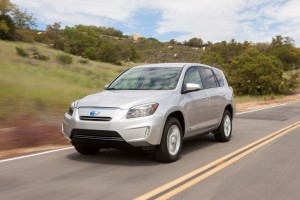
Toyota is putting the kibosh on the RAV4 EV, but it may not be the end of its working relationship with Tesla, according to Elon Musk.
With Toyota about to pull the plug on its slow-selling RAV4 EV, it looked like the Japanese maker also was switching off its relationship with Silicon Valley start-up Tesla Motors – but it now looks like another deal linking the two manufacturers is in the works.
Exactly what they’re working on hasn’t been revealed, but it could come to light in “two to three years,” according to Tesla Founder and CEO Elon Musk.
“If you look out maybe two or three years from now, I would not be surprised if there was a significant deal with Toyota and Tesla,” the oft-garrulous Musk told reporters during a visit to Tokyo.
The revelation comes just days after Tesla announced that it will build its so-called Gigafactory in Reno, Nevada, after receiving a state incentive package worth about $1.25 billion. Operating in partnership with Panasonic, the huge facility is expected to become the largest lithium-ion plant in the world. Musk has indicated Tesla intends to supply other automakers with the batteries produced there.
But whether that could include Toyota hasn’t been revealed, nor is Musk detailing anything that might be more extensive, such as a joint venture involving another vehicle, such as the RAV4 EV, which paired a drivetrain developed by Tesla with the body of Toyota’s popular compact crossover.
The vehicle was intended to help the Japanese maker meet new zero-emission vehicle regulations while also testing the waters for battery technology. At the time of its introduction, Toyota Vice President Bob Carter said the maker was hoping it would “attract sophisticated early technology adopters.” It may have, but not many others signed on. In all, total sales came to a miniscule 2,000.
Toyota earlier this year announced it would end the production run. Company officials tried to put a positive spin on the effort, however, noting that they never expected the RAV 4 EV to generate large-scale demand.
Though it was one of the first manufacturers to market a conventional hybrid-electric vehicle, Toyota has been openly skeptical about both the benefits and market potential of pure battery-electric vehicles. Indeed, Toyota and Tesla have sometimes traded potshots, albeit indirectly. The larger maker has often pointed to the limitations of lithium-ion technology, saying it favors hybrids and hydrogen fuel-cells as a long-term solution.
For his part, Musk has derided what he calls “fool cells,” and defended battery technology.
But with the State of California, China and other markets demanding battery vehicles, Toyota may find itself in need of some help again.
(Toyota pulling plug on RAV4 EV. For more, Click Here.)
The relationship between Toyota and Tesla dates back more than a half-decade, and along with the RAV4 EV project, the Japanese maker was an early investor in Tesla, while also selling the battery-carmaker the assembly plant it uses in Fremont, California. That plant once operated as NUMMI, a joint venture between Toyota and General Motors abandoned in 2009.
Toyota has declined to comment on the remarks Musk made in Japan.
(Click Here for details on Jaguar’s new XE sedan.)
But the media have been full of speculation about what sort of project Toyota and Tesla might be working on. And it could extend beyond a new electric vehicle platform.
Tesla has acknowledged it is working on autonomous vehicle technology and could bring an early version of that technology to market in about three years, with the launch of a new small car it has dubbed the Model III. It hopes to add fully autonomous technology a few years later. Also known as the Model 3, the sedan is expected to cost about $35,000, targeting a more mainstream segment than the current Tesla Model S.
(To see more about Dodge’s desperate moves to sell Vipers, Click Here.)
Toyota has traditionally avoided tie-ups with other manufacturers, but it has shifted direction in recent years, reflecting the increasing difficulty in staying atop all the various trends reshaping the auto industry. Along with the RAV4 EV, it developed a small sports car with the help of little Subaru. In the U.S., that vehicle is marketed as both the Scion FR-S and the Subaru BRZ.
